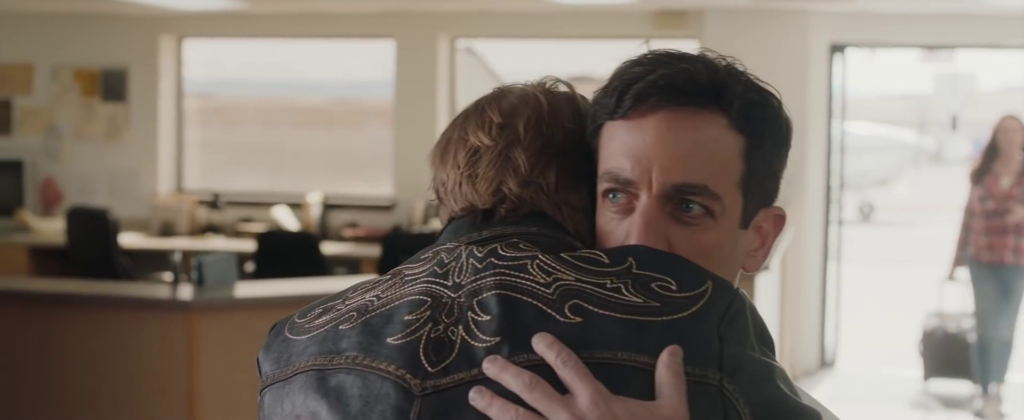
B.J. Novak is an American actor, screenwriter, director, and author who is best known for his roles as Ryan Howard on The Office (2005-13) and as Pfc. Smithson Utivich in Inglourious Basterds (2009).
Novak’s debut feature as a screenwriter and director is Vengeance (2022), opening this weekend, in which he also stars as Ben Manalowitz, a professional podcaster and New Yorker contributor who travels from New York to Texas after the mysterious death of a former hookup (Lio Tipton) in order to produce a Serial (2014-18)-esque podcast about her case, subsequently getting drawn into unforeseen conflicts with the girl’s family (led by a mother and brother, played by J. Smith-Cameron and Boyd Holbrook), local police, and regional celebrity record producer Quentin Sellers (Ashton Kutcher).
The Newton-born Novak brought Vengeance to Brookline last week for an early showing at the Coolidge Corner Theatre, and gave interviews earlier that day at The Newbury Hotel. The following transcript has been lightly edited for length and clarity, and begins just as I started recording, since Novak kindly confirms that our first exchanges are “on the record.”
NOVAK: Do you write for other publications, or full-time for [DigBoston]?
DIG: I work full-time in a totally different industry, in the marketing department of a cannabis company, actually one that has a dispensary in your old neighborhood.
Can you get my Dad the Kiva Chocolate Blueberries? Because he makes me bring them every trip from LA. He’s like, Will you bring those blueberries? And I’m like, Dad, first of all, I can mail them—by the way, this is fine if this is on the record—and second of all, I’m sure they have them in a dispensary in Boston. But he says they don’t have them.
The way it works is that because cannabis is a state-legal industry and not a federally-legal industry, nothing can be produced outside the state and then brought across state lines to be sold here.
Oh, so he’s right.
Well, it’s more like he’s half-right. Given those regulations, Kiva licenses their recipes to a cannabis business here, Revolutionary Clinics, who then reproduce the products using their own local facilities.
It’s so funny you bring this up, because I really want to read your dad’s cannabis book [High Culture: Marijuana in the Lives of Americans, 1980].
It’s from 1980, so the world has changed.
Yeah but if I understand correctly, it’s local too—it seems like it was written based on interviews with people in Massachusetts.
I think Massachusetts and New York, simply because those are the people he knew.
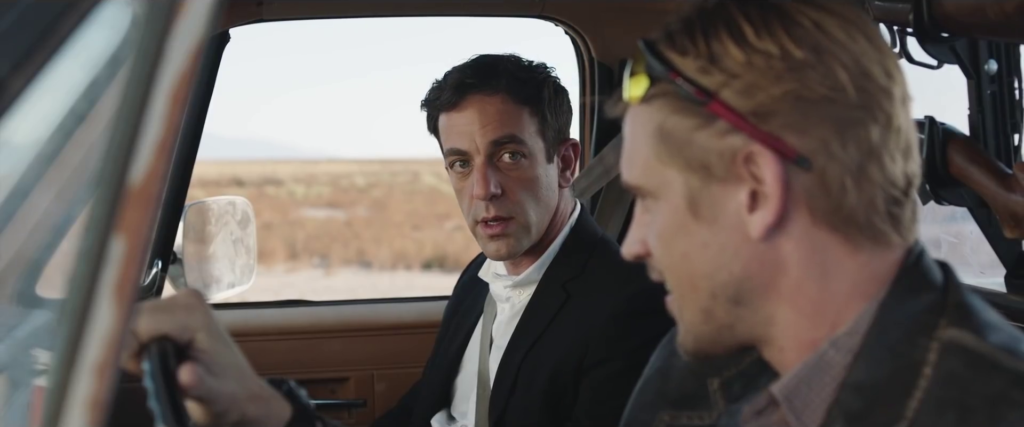
I definitely look forward to reading it.
Let’s talk about movies. Congratulations on the release of your feature… I’ll be totally honest, I saw Vengeance four days ago, and there’s so many different things about it that I’ve been going back and forth on since, turning over in my head.
One thing is that I want to seriously commend you for making a reckless comedy. I don’t see many reckless comedies these days.
I hope that you publish that because I would love to put that on a quote card, “a reckless comedy.” That’s an honor.
I’ll see that it makes the cut. Would you agree with that designation?
Well, what do you mean by it?
For one thing, I think you’re playing with different kinds of comedy. In Vengeance, you’re staging buffoonish physical comedy, and New Yorker humor (literally and figuratively), and a car bombing scene that’s played very straight, back to back to back… I think when I’m talking about reckless, that’s what I’m talking about.
Let’s talk about locating tone during writing, maybe that’s where there’s a question here.
I got an amazing piece of encouragement when, a long time ago, I met Aaron Sorkin. I had one question I wanted to ask him, which is, he had Sports Night (1998-2000) and The West Wing (1999-2006) on at the same time, so I said, How did you divide your mind between a comedy and a drama like that? And he said, Oh, I think of them as the exact same thing. I write comedy the same way I write drama.
Later he said that that was why he liked The Office so much. I didn’t create The Office, I joined it, but that was what I was trained to do as well.
Since then I’ve read a lot of people say this. Jimmy Burrows just wrote a book—Jimmy Burrows, like I’ve met him… [correcting himself] James Burrows wrote a book, and he says, I don’t make comedies, I make dramas with a lot of comedy in them.
I think that’s the secret that everyone needs to know, that comedies are just dramas. And the more drama you have, the more fuel you have for really explosive comedy moments. When your characters care about each other, that’s when comedy can really hit.
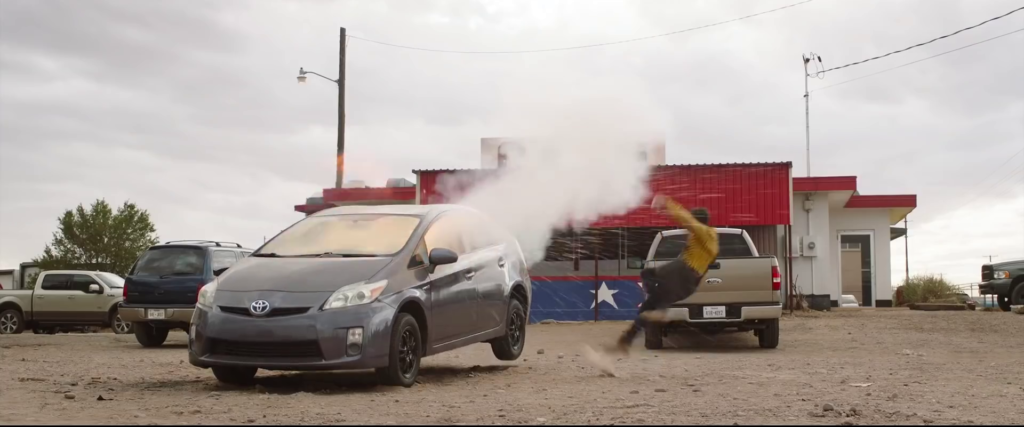
I’ve been thinking about Vengeance in terms of genre, and subgenres. And maybe this goes against treating it as a drama—also maybe it doesn’t—but I was thinking about it within the context of, like, 30s and 40s romantic comedies, screwball comedies, class- and culture-clash comedies. Were those kinds of films an influence?
Someone compared it to Preston Sturges, which was sort of a huge compliment… and someone I had to look up. I definitely knew Sullivan’s Travels (1941), and Sullivan’s Travels has a lot in common with Vengeance, in that it’s about a somewhat pretentious writer who thinks he’s going to discover the real meaning of America, and it’s not at all what he thought it was. He thought he was going to be very deep by judging, quote, “poor old America,” when in fact, “poor old America” is very vibrant, and it was he that was stuck in his own head.
I take that as a compliment [since it’s referring to] when comedies said something as a way of being funny. I admire that and try to be like that.
That also loops back to the comedy/drama question because Sullivan’s Travels is, like basically every other Preston Sturges comedy, very dramatic in parts, at least in my opinion. Like an irony of Sullivan’s Travels is that, for instance, the scene of all the prisoners watching the cartoon is not funny, right?
Yes, it’s like a tearjerker scene. Another thing about Sullivan’s Travels, and I wasn’t able to accomplish this much, but there’s a meta comedy where madcap physical comedy—the exact thing [Sullivan] didn’t want to make—is what happens to his character the whole time. He’s run off the road by a truck, and he lands in a pile of manure… I wasn’t able to dance like that.
That’s related to at least one thing you do in Vengeance, which is utilizing different styles of comedy as a way of talking about character. Which is something that’s true of not just Preston Sturges movies but we might also say classical Hollywood comedies in general.
Like, you tell me if I’m seeing things that aren’t totally there, but it seems to me that what’s happening in Vengeance is all the Deep South characters play broad comedy that’s oriented around physicality and punchlines, the kind of humor you might find in a sitcom or something. This isn’t about the quality of the performances, but J. Smith-Cameron is playing the film in a much different way than yourself and Issa Rae.
That’s interesting. I told everyone working on it that I wanted to make two movies. I wanted to make a New York conversations indie movie, and I wanted to make a Texas western revenge movie. And I said, I want both of those to be good movies. I knew that the western revenge movie had a good chance of being solid just because it’s so juicy. But New York conversational stuff can get really lame and pretentious, so I was like, how do I make these guys actually really interesting? I want him hitting on girls with John Mayer and thinking it’s cooler than it is. And I want Issa Rae busting his balls. Like a modern version of that sort of smart, snappy thing.
I guess I didn’t really think of the Texas stuff. When Ben arrives at the [Texas] family’s house, and it’s staged a little like a sitcom, I did say that I want this to feel like Meet the Parents (2000). All of a sudden, we’re in a very cozy warm comedy. And so it may play a little like a sitcom for that reason.
I’m not even saying it plays like a sitcom, I’m talking more about performance style. So you say New York conversation indie and Texas western revenge movie, but when it comes to comedy, I think we can get even more specific, it’s like the New York characters are in a Woody Allen movie and the Texas characters are in Tobacco Road (1941).
I think J. Smith-Cameron really embodies that because she’s best known for theater and Succession (2019-), and here she is playing a Texan mom, it’s such a different style.
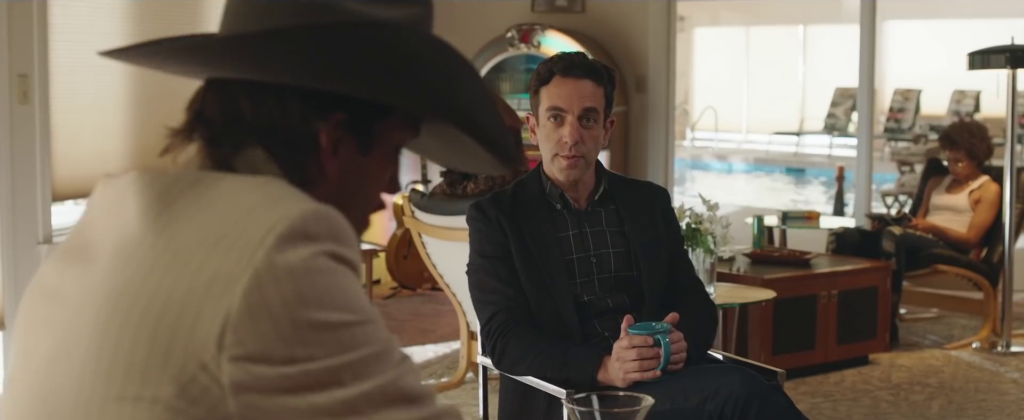
Ashton Kutcher plays Quentin Sellers. Where’s that name coming from—is it a Tarantino reference?
No, I think people think so, but originally I was picturing Peter Sellers’ Quilty in Kubrick’s Lolita (1962). I was thinking, He’s the better and worse version of our main antihero, and I want him to meet his doppelganger that he needs to reckon with.
At first I called him Q. Sellers, then Q became too associated with QAnon, and I was like, Oh God, I can’t even imagine the conspiracy theories that will come from this movie if his name is Q. So I had to give Q a name, and I named him Quentin.
I jumped to a conclusion, knowing you’ve cited Tarantino as an influence.
Tarantino is a huge, huge figure in my life.
On that note I’d like to ask some questions about Inglourious Basterds. I was recently putting together material for a program on Jackie Brown (1997) at the Coolidge Corner Theatre, and I became fixated on the total centrality of performance in Tarantino’s movies, in terms of process, theme, everything.
Completely true. And the same way people don’t recognize that Scorsese’s weapon is his comedy, people don’t notice that Quentin’s gift is his performances. Because people are so dazzled by the style of these great stylists, they don’t realize what’s really powering the movies, and with Tarantino that is performance.
More than anyone, Tarantino reminded me of my high school theater teacher Jim Honeyman at Newton South. I say that because he works with actors the way you’re supposed to work with actors—the way you’re supposed to have a table read, and then rehearsals, and then when you feel it’s time to start standing up, you naturally stand up, and you come up with a character backstory, and you talk about it. He believed in all of that, and he had this sort of awe about the actors’ process that I have not seen in any other director.
Every director cares about acting, and I’ve seen different directors respect actors in different ways, but I’ve never seen someone go at it from that high school point of view. And I mean that as such a compliment, because that’s back when you’re idealistic. Here was someone who’s idealistic about acting, and it shows up.
Tarantino movies seem to let actors reorient the emotion of a scene in the moment, depending on how they’re feeling that day and what they’re bringing to it. I know Samm Levine has told a really good story about one scene of Basterds that went a few different ways depending on how he performed, and the ending of Jackie Brown is another good example.
Were there any times for you, on Basterds, where the work of acting led the art of the film into a direction that was unexpected, or new, or not there on the page?
The final shot, which is now iconic… In fact, I was at Universal Studios on the, you know, tourist tour, and they had a big screen showing their classic Universal movies. Or really, showing .GIFs of classic Universal movies. And there was me and Brad Pitt at the end of Basterds. Mindy Kaling got me a birthday cake of that shot.
That, in the script, was “they cackle maniacally”—
—“They ghoulishly giggle.” I just reread it, and was thinking, that’s a good phrase.
I’ve heard that it’s harder to laugh on cue than it is to cry on cue. By the way, I did cry on cue in that movie, but the scenes were cut, with Utivich in the truck. So, I was like, How are we going to laugh on cue? I guess I’ll just follow Brad’s lead. And in the moment, I didn’t feel like laughing. I felt like this satisfaction, and this sort of orgasm, this feeling of fuck yeah. So he and I both did that. And I thought Quentin would yell, It says laugh!, but he was very happy, and kept doing variations of the nod. It felt right in the moment, I think we all felt it.
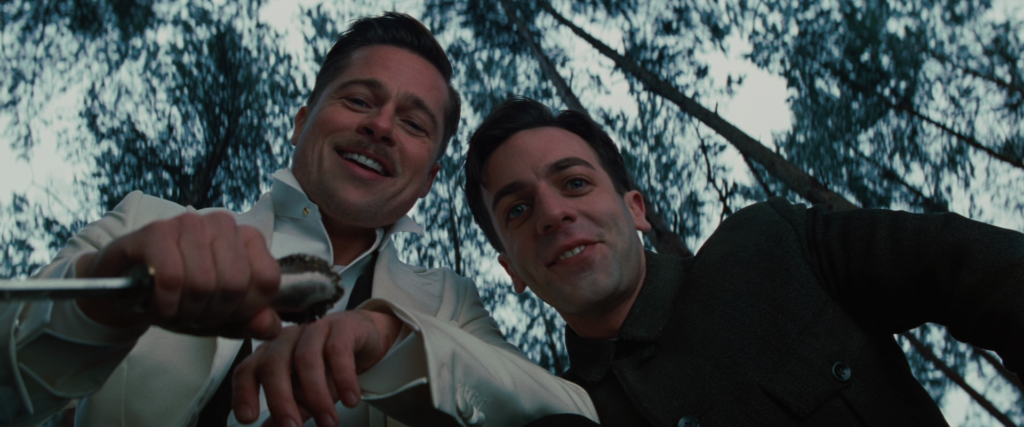
That’s one of the more directly self-aware moments in all of Tarantino movies, characters staring into the frame and communicating directly to the audience, it’s like that and Kurt Russell breaking the fourth wall for a second in Grindhouse.
I felt like Pulp Fiction was talking to the audience, in a spiritual way. I remember when he walks into Mia Wallace’s house and “Son of a Preacher Man” is playing… I remember being in the theater at Cleveland Circle, and thinking, Someone chose that song—I saw that guy in Entertainment Weekly, Quentin Tarantino—he chose that song. And I realized the whole movie was authored. I knew what a screenwriter did, vaguely, or what an actor did, but it had never occurred to me that a movie was directed.
After watching Inglourious Basterds again last night, I ended up with a slightly different reading of that final line. I was like, This is [editor] Sally Menke’s masterpiece. That movie does things with editing action that I’ve maybe never seen in any other movie. It cuts so fast, yet so legibly… the combination of classical linear action editing with totally chaotic speed.
I sat in once to watch her do rushes, which I imagine they don’t do anymore, maybe [Christopher] Nolan does. But I watched, and I couldn’t believe her eye. She would say things about the frame that were so technical—if it was an eye chart, it was like she was reading a letter that was across the street. I didn’t go back after that because it was like, I can’t even process what she’s doing. She was a wonderful person. And I think Kill Bill (2003-04), which is not my favorite of his movies, but the editing of Kill Bill is astounding.
On the subject of editing, what do you miss about Basterds? Do you miss the crying scene? I know the vet scene was longer, too, and you had some great lines there. If you watch it, do you miss things?
It killed me at first, because I knew the movie we shot, and I knew the script, and I missed the stuff I had been in so much. But over time, the movie is the movie.
Like on The Office, sometimes it would kill me that a 24-minute version of the episode was so much better than the 20-minute version we aired. But people still loved the 20-minute episodes in the same proportion they would have at 24 minutes. So I think people get the spirit of something. But of course it was, it was very sad. Every second of the movie that I was in, that’s not on screen, I was sad. And to an extent the stuff in the script, as well, because I love the script too.
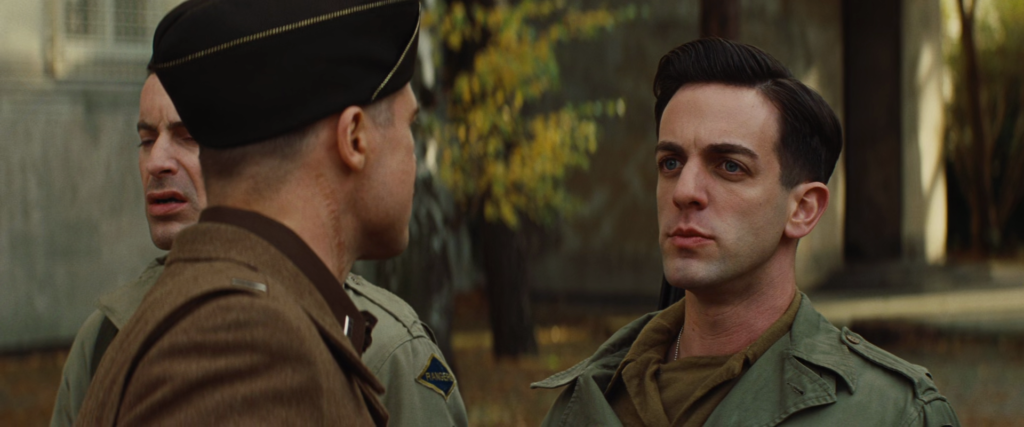
Part of why I was thinking about Menke’s editing in relation to performance is that last night I basically watched the B.J. Novak version of Inglourious Basterds, my eyes were on you anytime you were on screen. And there’s just so much good stuff caught in the cut. For instance I noticed your character blinking repeatedly right after Aldo walks past him in the line, presumably because you wanted to stand at unblinking attention when he’s in front of you.
In that scene, we all yell Yes sir!, and I was really, really in that moment. Quentin said after, Everybody, Novak’s the doctor in this shot. And I’ve never heard that phrase before or since, but I took it to mean, He’s the expert, he’s the guy who’s getting it right. And man, I felt so proud. I’m glad I got that close-up.
Vengeance opens on Friday, July 29, at theaters including the AMC Boston Common, Coolidge Corner Theatre, and Landmark Kendall Square.
